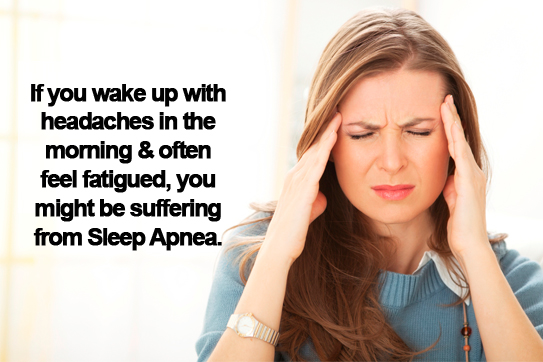 If you have trouble sleeping or wake up with headaches, you might have a sleep disorder called obstructive sleep apnea. This condition, which is more common amongst overweight individuals, causes the sufferer to stop breathing as long as ten seconds at a time during sleep. Unfortunately, the symptoms of sleep apnea are vague enough that they can be hard to detect. Here are a few symptoms that you might suffer from this common condition:
If you have trouble sleeping or wake up with headaches, you might have a sleep disorder called obstructive sleep apnea. This condition, which is more common amongst overweight individuals, causes the sufferer to stop breathing as long as ten seconds at a time during sleep. Unfortunately, the symptoms of sleep apnea are vague enough that they can be hard to detect. Here are a few symptoms that you might suffer from this common condition:
- Loud Snoring: Because sleep apnea occurs when the muscles of your throat relax too much, sleep apnea sufferers typically report loud, uncontrollable snoring.
- Fatigue: Are you overly tired throughout the day? In addition to making it hard to focus, fatigue can also impact your ability to drive safely and invest in meaningful conversations.
- Morning Headaches: If you tend to wake up with painful headaches, it could be a sign that you aren’t getting enough oxygen to your brain because of sleep apnea.
If you have any of these symptoms, talk with your doctor about your sleep habits. Your physician might ask you to take part in a sleep study so that experts can analyze your breathing habits. If problems are found during your sleep study, your doctor might suggest these treatments:
Treatments for Obstructive Sleep Apnea
Don’t despair if you have sleep apnea. Here are a few ways you might be able to find relief, so that you can sleep soundly and safely:
- Continuous Positive Pressure Systems: To keep your airway open, some doctors prescribe continuous positive pressure systems, or CPAP machines. These devices continuously pump air into your throat through a mask while you sleep. Although these machines take a little while to get used to, they are highly effective and can help you to sleep without problems.
- Mouthguards: However, if you have a mild case of sleep apnea, you might be able to treat it effectively with something as simple as a mouthguard. These oral appliances change the way that your jaw closes, which keeps the muscles of your throat from collapsing. In addition to being comfortable, mouthguards are also easier to take on the road, making them perfect for frequent travelers. Also, since oral appliances are a more discreet treatment option, they are better for people who might be shy about wearing a mask overnight.
If you have been diagnosed with sleep apnea and you think that oral appliance therapy would work for you, call our office today to schedule a consultation with Dr. Weyneth today.
